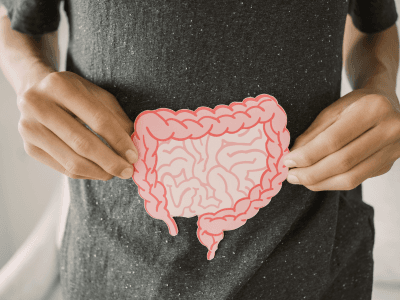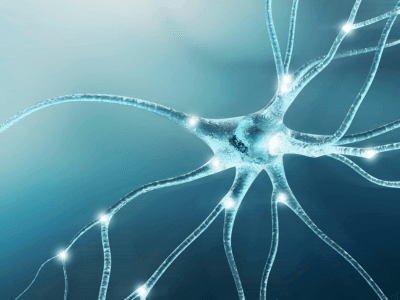Dr. Rachel Stricker Blog
Utilizing the Gut-Brain Axis to Improve Digestive Health
ggg

Digestion isn’t just a physical process—it’s a dynamic conversation between your gut and your brain. You’ve likely heard phrases like “you are what you eat” or felt a “gut instinct” or “butterflies in your stomach” before a big moment. These aren’t just metaphors—they’re reflections of a deep, scientifically backed connection between your digestive system and your mental and emotional state. The truth is, your gut and brain are in constant communication, and that relationship plays a powerful role in how you feel, think, and function.
The Gut-Brain Connection
The gut-brain connection and the gut-brain axis has been well-established and is gaining a lot of interest in functional medicine, psychology, and gastroenterology. This gut-brain connection likely has many effects on mood, motivation, and higher cognitive function. It is likely that the sympathetic and parasympathetic innervations (mostly the vagus nerve) mediate the emotional patterns and regional changes experienced in the gastrointestinal (GI) tract.
The Vagus Nerve: Your Body’s Communication Superhighway
The vagus nerve is known as the wandering nerve. It is the 10th and longest cranial nerve, running from the brainstem to the neck, chest (including heart and lungs) and to the abdomen (including stomach and intestines). It is involved in both the parasympathetic and sympathetic nervous system, including involuntary processes like heart rate, breath, and digestion.

The parasympathetic nervous system is often referred to as the “rest and digest” aspect of the nervous system, while the sympathetic is referred to as our “fight or flight” system. The vagus nerve carries sensory (afferent) input from the gut to the brain, including signaling of stomach stretching, nutrients, irritants, pain, and inflammation. These sensations, in turn, can change the mental emotional state. The vagus nerve also carries motor (efferent) input from the brain to the gut to regulate digestive processes, like gastric acid secretion, intestinal motility (movement through gut), and smooth muscle contraction. It even coordinates with the gut microbiome!
The Enteric Nervous System and HPA Axis: How Stress Shapes Digestion
Aside from the bidirectional connection with the central nervous system (CNS) via the vagus nerve, the gut also has an enteric nervous system that functions independently from the CNS. This enteric nervous system receives input not only from the CNS but also from the gut’s immune system, microbiome, and endocrine system, particularly the hypothalamus-pituitary-adrenal axis (HPA Axis). We predominantly think about the HPA Axis involvement in our stress response, particularly the release of epinephrine and cortisol, but it is also involved in the regulation of blood sugar, water retention, sex hormones, temperature, and much more.

Studies have shown that irritable bowel syndrome (IBS) patients have an impaired HPA Axis, including decreased cortisol levels and cortisol response and increased vagal activation, therefore putting them into a sympathetic state more frequently. In these patients, we often see difficulty in coping with stress, co-morbidities of anxiety and depression, and a history of abuse. It’s likely that this upregulation of the nervous system has led to visceral hypersensitivity, a more acute and intense experience of the physical sensations of the gut.
Gut Microbiome and Mental Health: The Science Behind the Connection
Further proof of the importance of the gut-brain connection come from the large body of research showing that the gut microbiome affects mental health, particularly depressive states. A pivotal research study in 2016, showed that germ-free rats who received a transplant of depressed patients’ microbiota actually started showing depressive-like behaviors. In 2017, a study of pregnant women were given Lactobacillus rhamnosus and were found to have significantly less postpartum anxiety and depression than those who were not given this probiotic.

Interestingly, 90-95% of the neurotransmitter serotonin is found in the gut. Serotonin regulates gut motility, secretion, immune responses, promotes feelings of well-being and happiness, influences the release of melatonin which contributes to the sleep-wake cycle, affects appetite and satiety, and contributes to cognitive function like memory and learning.
Why This Connection Matters for Your Health
Your gut and brain are in constant, dynamic dialogue—and that conversation shapes far more than digestion. From mood swings to memory, stress resilience to sleep quality, the gut-brain axis plays a central role in how we feel, think, and function each day. With the vagus nerve acting as a superhighway between these two systems, and the gut microbiome influencing everything from serotonin levels to emotional regulation, it’s clear that mental and digestive health are deeply intertwined.
Science is mounting: to nourish the mind, we must also care for the gut. It's time we stop thinking of the gut as just a digestion machine and start recognizing it as a second brain—one that deserves just as much attention.
6 Tips to Improve Gut-Brain Axis
- Practice Yoga
A yoga practice in general is meant to help refocus the mental and vital energies and regulate the nervous system, creating better access to the parasympathetic nervous system through breath work and mindful movement.
- Focus on How You Eat
If you’re not in a parasympathetic state, chances are you’re not digesting your food properly. Take time to slow down before meals. Saying a prayer, blessing, expressing a deep sense of gratitude or taking a few slow, deep breaths prior to taking your first bite will help you get into that state of being. Try to avoid eating when you are stressed, upset, or in a hurry. Take time to thoroughly chew your food and eat slowly, stopping when you are no more than 80% full.
- Take a Walk
Taking a moderately-paced walk after eating helps improve digestion and blood sugar balance. If you’re not able to walk, remain upright for at least 30 minutes after eating.

- Enjoy a Cup of Carminative Tea Meals
Carminatives are one of my favorite classes of herbs as they are so gentle and soothing to the digestive system as well as calming to the nervous system. They help prevent gas, indigestion, bloating, and can create a sense of tranquility. Some lovely carminatives include fennel, chamomile, peppermint and lemon balm.
- Try Vagal Toning Exercises
Gargling, yawning, singing, humming, diaphragmatic breathing, cold exposure, and eye movements all help access the different innervations of the vagus nerve and can help regulate the nervous system.
- Support a Healthy Gut Microbiome
Taking a high-quality probiotic or eating fiber-rich, prebiotic food and fermented foods helps balance the gut microbiome.
Caring for your gut is caring for your mind. By supporting the gut-brain axis—through mindful habits, nourishing foods, and practices that calm the nervous system—you can improve digestion, boost mood, and enhance overall well-being. Even small daily steps, like deep breathing before meals or enjoying calming teas, can help your gut and brain work in harmony so you feel your best inside and out.
References
- Coss-Adame E, Rao SS. Brain and gut interactions in irritable bowel syndrome: new paradigms and new understandings. Curr Gastroenterol Rep. 2014 Apr;16(4):379. doi: 10.1007/s11894-014-0379-z. PMID: 24595616; PMCID: PMC4083372.
- van Orshoven, N.P., Andriesse, G.I., van Schelven, L.J.et al. Subtle involvement of the parasympathetic nervous system in patients with irritable bowel syndrome. Clin Auton Res16, 33–39 (2006). https://doi.org/10.1007/s10286-006-0307-x
- Kelly, J. R., et al. (2016). Transferring the blues: Depression-associated gut microbiota induces neurobehavioural changes in the rat. Journal of Psychiatric Research, 82, 109–118. https://doi.org/10.1016/j.jpsychires.2016.07.019
- van Orshoven, N.P., Andriesse, G.I., van Schelven, L.J.et al.Subtle involvement of the parasympathetic nervous system in patients with irritable bowel syndrome.Clin Auton Res16, 33–39 (2006). https://doi.org/10.1007/s10286-006-0307-x
- Heitkemper M, Jarrett M, Cain K, Shaver J, Bond E, Woods NF, Walker E. Increased urine catecholamines and cortisol in women with irritable bowel syndrome. Am J Gastroenterol. 1996 May;91(5):906-13. PMID: 8633579.
- Evans S, Lung KC, Seidman LC, Sternlieb B, Zeltzer LK, Tsao JC. Iyengar yoga for adolescents and young adults with irritable bowel syndrome. J Pediatr Gastroenterol Nutr. 2014 Aug;59(2):244-53. doi: 10.1097/MPG.0000000000000366. PMID: 25025601; PMCID: PMC4146428.
- Schumann D, Langhorst J, Dobos G, Cramer H. Randomised clinical trial: yoga vs a low-FODMAP diet in patients with irritable bowel syndrome. Aliment Pharmacol Ther. 2018;47:203–211.
- Sigrid, B. et al Vagus Nerve as Modulator of the Brain-Gut Axis in Psychiatric and Inflammatory Disorders. Frontiers in Psychiatry, 9 (2018).
Join the Mederi Center community by signing up for our email list. We send several emails a month with product promotions for patients, practical tips for healthy living, blogs written by our Care Team, information about events, and other news. You can unsubscribe at any time.

Meet Dr. Rachel Stricker
Rachel Stricker, ND, is a licensed naturopathic doctor who is passionate about helping people feel their best by blending natural therapies with compassionate, personalized care. With over a decade of experience, including eight years in private practice, she specializes in specializes in GI health, autoimmune disease, Lyme disease and chronic infections (Epstein Barr, Long COVID, etc.), hormonal balance, and detoxification (mold toxicity, environmental toxicity, etc.). Dr. Stricker integrates her background as a yoga instructor and plant-based chef to help patients reduce stress, nourish their bodies, and build lasting vitality. She was drawn to the Mederi Care model for its deep focus on botanical medicine, clinical nutrition, and whole-systems healing, and loves working alongside patients to create integrative treatment plans that support long-term health and resilience. Learn more about Dr. Stricker here.
Learn more about becoming a patient >>


